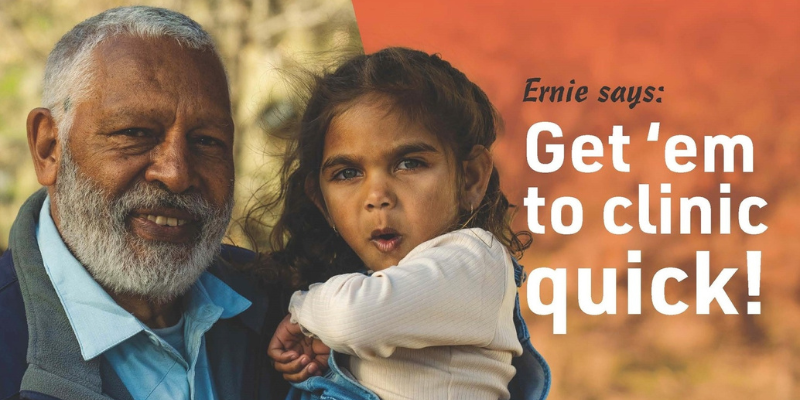L'il one got wet cough long time?

September marks the three-month milestone of an intensive health promotion campaign in the East Kimberley region, which aims to raise awareness of the dangers of a chronic wet cough in Aboriginal children.
Researchers from the Wal-yan Respiratory Research Centre and the Kulunga Aboriginal Unit at The Kids Research Institute Australia have partnered with Kimberley Aboriginal Medical Services, Yura Yungi Aboriginal Medical Services, Aboriginal families, and clinicians in the East Kimberley to improve the lung health of Aboriginal children.
They aim to raise awareness and to develop solutions for timely detection, accurate diagnosis, and optimal management of chronic wet cough in Aboriginal children.
A wet cough experienced by a child for more than four weeks can be a sign of underlying infection known as protracted bacterial bronchitis. If left untreated, this can lead to irreversible, life-shortening lung damage known as bronchiectasis.
Protracted bacterial bronchitis is prevalent in Aboriginal children. It was recently identified in 10 per cent of Aboriginal preschool children in communities in the West Kimberley region of Western Australia.
This campaign, which builds on a successful wet cough prevention health campaign carried out in Broome, was implemented in Halls Creek and the Balgo, Mulan and Billiluna communities in the Kutjungka region, together comprising around 2,200 people.
The health promotion campaign is focused on empowering the local communities and is led by an Aboriginal health promotion officer with the support of a local community navigator. The health promotion team raise awareness about chronic wet cough through in-person yarning, and the team are equipped with culturally secure materials including flip charts, posters, talking posters, banners, flyers, stickers and badges.
Co-designed with the Aboriginal community and supported by Ernie Dingo and Francis Watson who feature in the health promotion resources, the campaign also includes health messages played on the region’s radio station and targeted social media advertisements.
In addition to face-to-face training sessions, resources for local Aboriginal Medical Services clinicians were also developed including eLearning modules, a chronic wet cough management flowchart and podcasts.
Dr Gloria Lau, a researcher with the Wal-yan Respiratory Research Centre – a powerhouse partnership between The Kids Research Institute Australia, Perth Children’s Hospital Foundation and Perth Children’s Hospital (PCH) – and a paediatric respiratory doctor at PCH, has been working with the community to design and roll-out this campaign.
“The disparity between Indigenous and non-Indigenous patients with bronchiectasis is particularly marked. In the Kimberley region, the median age at death for Indigenous adults hospitalised with bronchiectasis is 37 years,” Dr Lau said.
Children are not born with bronchiectasis, it develops over time. The longer the duration of wet cough in a child, the more extensive the lung damage can be. However, damage can be halted, limited or even reversed if chronic wet cough is detected and managed early.
“We believe that the burden of chronic lung disease in Aboriginal adults can be reduced if early lung disease is managed effectively in children.
“That is why getting this health campaign right is so important, and we cannot do that without the input and guidance from the local community. Partnering with the East Kimberley community has meant that together we have been able to design and implement a culturally meaningful and sustainable information and education campaign.
By doing so, we are increasing the chances that the campaign will be a success, and in turn the lung health of Aboriginal children in these communities will be improved in the short and long term.
Importantly Dr Lau’s work with the community was supported by Liam Bedford, who has strong family ties in the East Kimberley. Liam is the Community Capacity Building Coordinator within the Kulunga Aboriginal Unit at The Kids Research Institute Australia based in the Kimberley.
Dr Lau and her research team, led by Associate Professor André Schultz, aim to partner with other Aboriginal communities around Australia to roll out similar campaigns, each adjusted to be culturally meaningful and sustainable for the communities in which they are delivered. Currently, work is underway in Derbarl Yerrigan Health Service in Perth and sites in the Northern Territory and Queensland.
If the campaigns prove to be successful, it is hoped that the campaign together with the implementation approach can serve as a guide for raising awareness and improving management of chronic wet cough in Aboriginal children across Australia.
- Mineral Resources proudly supports the Wal-yan Respiratory Research Centre as Principal Partner of the BREATH (Building Respiratory Equity for Aboriginal and Torres Strait Islander Health) Team. The team is led by paediatric lung health researcher, and Mineral Resources Fellow, Associate Professor André Schultz.
All promotional materials and resources from the wet cough campaign are available at www.telethonkids.org.au/our-research/research-topics/wet-cough/
